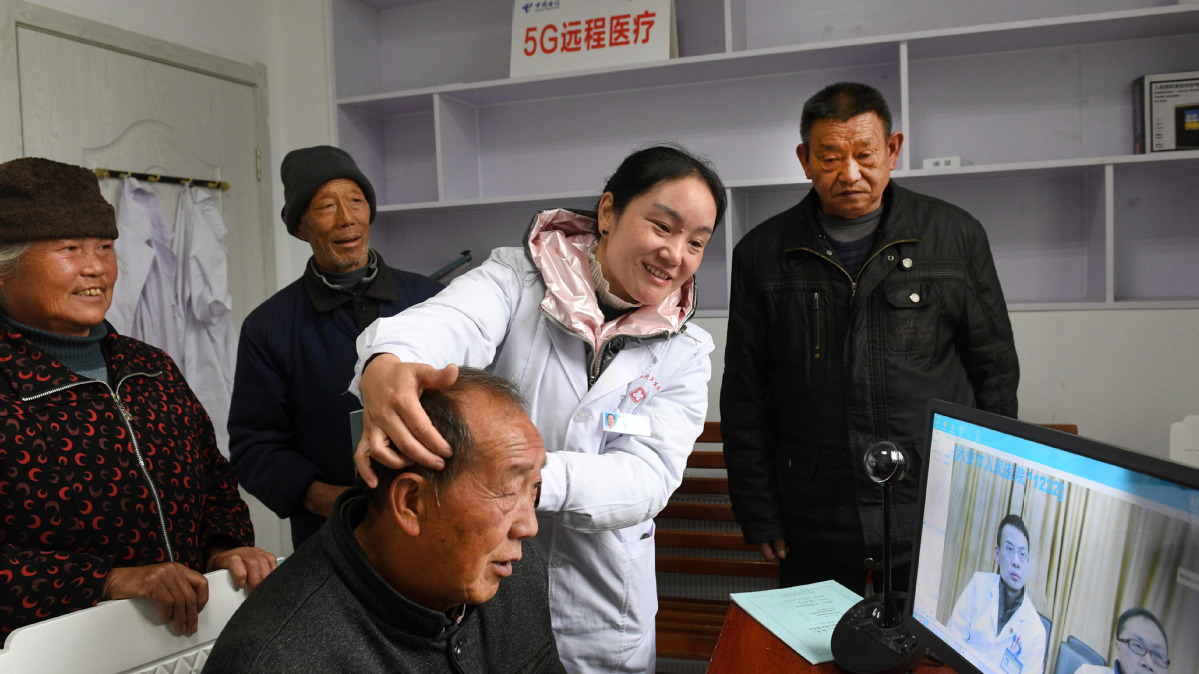
A village doctor, 2nd L, helps a patient take part in a virtual consultation in Jinzhai County, east China's Anhui Province in December 2020. /Xinhua
A village doctor, 2nd L, helps a patient take part in a virtual consultation in Jinzhai County, east China's Anhui Province in December 2020. /Xinhua
Online health medical care in China has witnessed rapid development thanks to whizzy internet technology and strong government support.
In 2020, the number of online medical users in China reached 661 million, more than three times the total amount of users in 2015, according to data released by consultancy iiMedia Research.
The market size of online medical care in the world's most populous country stood at 54.47 billion yuan ($8.41 billion).
Analysts point out that it's people's increasing demands for medical e-commerce and online medical care platforms that bring the fast application of internet in the medical care field.
Data from the National Health Commission (NHC) showed that more than 7,700 Grade II and above hospitals, with a higher number of beds and more comprehensive medical services, have provided online medical services, and the collaborative telemedicine network covers more than 240,000 medical institutions in cities across China.
Read more:
Telemedicine covers all county-level hospitals in over 800 poor counties
"The use of online services for making appointments, bill payments and collection of medical test results has brought convenience to patients," Jiao Yahui, an official with NHC, said at a press conference on April 27.
"Thanks to internet technology, many hospitals can provide medical services online. This in some sense lets people in under-developed regions know and reach quality medical services from hospitals located in developed areas," Yi Linhua, a doctor with Beijing Children's Hospital affiliated to Capital Medical University, told CGTN.
It's reported that the ongoing COVID-19 pandemic also pushed some public hospitals to embrace internet technology to provide convenient health care services for people who cannot go to the hospitals due to the epidemic prevention and control measures.
Amid the ongoing COVID-19 pandemic, the development of online medical care helps reduce the number of patients visiting hospitals and avoid cross-infection caused by crowds, said Yi.
02:12

"During the epidemic, many patients tried the online medical consultation service of platform for the first time," Wang Hang, founder and CEO of online healthcare company Haodf, told CGTN on the sidelines of Boao Forum for Asia 2021.
Du Yuchen is one of those turning to online medical services for the first time during the epidemic. "I felt relieved when I found I could appoint an online video call with the doctor who treated my girl and talked with him about my girl's condition," said Du, who lives in Wuhan and had planned to take the girl to Beijing to recheck her recovery in February.
Online medical service in China got a new boost as the General Office of the State Council released a policy document on April 15 that the country decides to greenlight the online sales of prescription drugs, except for those placed under special management.
Prescription drugs refer to medicines that patients can purchase only with a medical practitioner's authorization, limiting sales of this kind to hospitals and pharmacies.
The decision was said to give patients more choices rather than being limited to pharmacies, clinics or hospitals.
Along with its fast development, online healthcare services also faced problems such as sales of counterfeit products, exaggerated advertisements and unlicensed operations.
The Government Work Report delivered at the two sessions this March required a standardized development of internet plus healthcare service.
So far, 30 provinces in the country have established online healthcare service supervision platforms to improve online supervision in the industry.
Speaking of the online healthcare service, Zhang Guogang, director of the Third Xingya Hospital of Central South University, told People's Daily that "internet is used to help provide medical services, so the medical quality and safety always come first."
"It's necessary to have a rigid management on aspects including remote medical treatment, prescription review, and online transactions," said Zhang, adding that this could ensure a better future for the booming industry.

